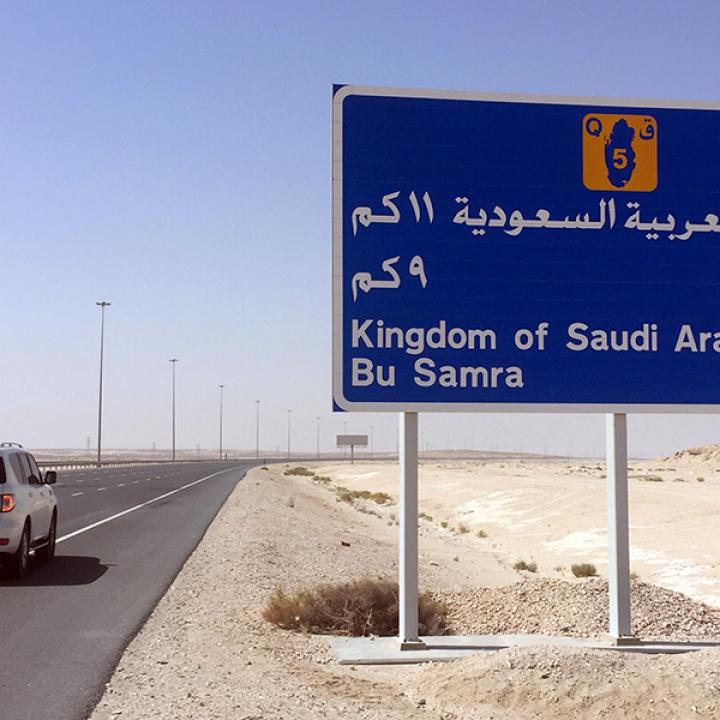
- Policy Analysis
- Policy Alert
Gulf Crisis with Qatar Challenges the United States

Extremely tough conditions set by Saudi Arabia and the UAE for resolving the diplomatic rift with Qatar could force Washington to choose sides.
The list of thirteen demands to which Qatar must respond within ten days appears to reflect longstanding desires -- although not publicly stated until very recently -- by Riyadh and Abu Dhabi, of which Doha has been dismissive. Yet it is hard to see how this list was formulated with the intention of achieving a resolution rather than a complete undermining of diplomacy. There appears little way Doha can save any face. Perhaps the list reflects an opening maximalist salvo designed to prompt negotiation, but the prerequisite for agreement on all points suggests otherwise.
Qatar has to:
- Curb diplomatic ties with Iran. Only trade and commerce that complies with U.S. and international sanctions will be permitted.
- Declare the Muslim Brotherhood, the Islamic State, al-Qaeda, and Lebanese Hezbollah to be terrorist organizations and sever all ties.
- Shut down Al Jazeera and other Qatar-linked news outlets.
- Terminate the Turkish military presence in the country and end joint military cooperation.
- Stop all means of funding for those designated as terrorists by Saudi Arabia, the UAE, Egypt, Bahrain, the United States, and other countries.
- Hand over terrorists and wanted individuals from Saudi Arabia, the UAE, Egypt, and Bahrain to their countries of origin and freeze their assets.
- End interference in sovereign countries' internal affairs.
- Stop all contacts with the political opposition in Saudi Arabia, the UAE, Egypt, and Bahrain.
- Pay reparations and compensation accounting for the consequences of Qatar's policies in recent years.
- Align itself with Gulf and Arab countries militarily, politically, and economically.
- Agree to all demands in ten days or the list becomes invalid.
- Consent to monthly audits for the first year and then regularly over a total of twelve years.
The list does not amount in so many words to a call for regime change in Qatar, but rather to one for altered policies. Nevertheless, Doha is likely to view it as pressure to remove Emir Tamim bin Hamad al-Thani and his father, Hamad bin Khalifa, known as the "father-emir" and still regarded, especially by the UAE, as the power behind the throne since his abdication in 2013.
The prominent role in the confrontation of four countries -- Saudi Arabia, the UAE, Egypt, and Bahrain -- is easily explained. Saudi Arabia has long been irritated by Qatar, the huge gas reserves of which give it financial independence from the kingdom. The UAE has resented the support Qatar has given to the Muslim Brotherhood, members of which have plotted against the ruling family in Abu Dhabi, the leading emirate of the confederation. President Abdul Fattah al-Sisi of Egypt overthrew the Muslim Brotherhood regime, which survived in power for two years largely because it was propped up financially by Qatar. Bahrain has had a history of land disputes with Qatar -- and while these were resolved in 1994, ill will persists, encouraged by Riyadh.
Perhaps inconveniently for Washington, the demands make a point of associating the United States with the crisis, a position that, exacerbated by mixed messages from the White House, and the Defense and State Departments, may only complicate its resolution. The wording does not give Washington an obvious role in any diplomacy, and U.S. secretary of state Rex Tillerson had earlier said the demands should be "reasonable and actionable."
Also worrying is the apparent lead being taken by the newly promoted Saudi crown prince Muhammad bin Salman and his UAE counterpart, Sheikh Muhammad bin Zayed al-Nahyan, until now perceived as a restraining influence on MbS's impetuousness, exhibited by the military intervention in Yemen -- a side consequence of which is the creation of al-Qaeda safe havens.
Whether Riyadh and Abu Dhabi lose support in international public opinion over the nature of the demands will be interesting to see. While Al Jazeera has a well-established reputation for troublemaking and poor journalism, some countries may be thinking that -- however unhelpful the Qatari media might be -- the ending of Saudi support for madrasas across the world could be a useful addition to any diplomacy.
For its part, the United States may well find itself under renewed pressure from Saudi Arabia and the UAE to give up its use of the al-Udeid Air Base in Qatar, which has played a key role in the fight against the Islamic State in Iraq and Syria.
Washington may need to do some tough talking with all its Gulf allies, and quickly, to secure itself a role in the diplomacy, ameliorating the crisis and stopping its escalation.
Simon Henderson is the Baker Fellow and director of the Gulf and Energy Policy Program at The Washington Institute, and coauthor of its 2017 Transition Paper Rebuilding Alliances and Countering Threats in the Gulf.



